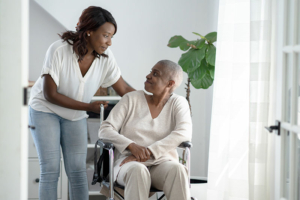Bridging Differences: How-To Guide for Effective Family Communication

Learn tips for effective family communication that helps make sure everyone is heard and respected.
Caring for an older adult at home can put a strain on family dynamics. Siblings may disagree on care decisions, adult children may feel stressed, and aging parents may resist help. Effective family communication is vital to bridge the gap between differing opinions, ease the responsibility of caregiving, and ensure everyone feels heard and valued.
Before your next family discussion, take some time to consider these helpful suggestions:
- Check in frequently: Schedule regular family meetings or check-ins to discuss caregiving arrangements, share updates, and address any concerns or conflicts that develop. These meetings provide you with an organized platform for open communication and collaboration, ensuring everyone remains informed and involved with the caregiving process.
- Be open and honest: Encourage open and honest dialogue with everyone in your family. Steering clear of complicated topics or sugar-coating concerns can result in misunderstandings and tension. Be transparent about your worries, limitations, and expectations about caregiving responsibilities.
- Communicate clearly: Be clear and concise in your communication to prevent confusion or being misunderstood. Clearly outline expectations, responsibilities, and plans regarding caregiving tasks. Use simple language and avoid jargon, particularly when talking about medical or legal matters related to your family member’s care.
- Watch for non-verbal cues: Observe body language, facial expressions, and tone of voice. These can often express emotions and intentions more truthfully than words alone. Maintain eye contact, use a calm tone, and be aware of your own body language to convey empathy and understanding.
- Respectfully disagree: It is natural for family members to have differing opinions or approaches to caregiving. However, disagreements must be handled with respect and maturity. Avoid resorting to blame or criticism and instead concentrate on finding common ground through constructive dialogue and compromise. Practice active listening: Instead of just hearing words, actively listen to understand the underlying emotions and intentions behind them. When talking about care options for your loved one, listen attentively to every person’s perspective without interrupting, and then reflect back to ensure that you are understanding each other correctly.
- Exercise empathy: Empathy enables you to interact with others on a deeper level, fostering mutual support and understanding. When discussing the challenges of looking after an older loved one, try stepping into each other’s shoes to see individual perspectives and offer compassionate support.
Caring for an older loved one is undoubtedly challenging, but with effective family communication and support, it can also be profoundly rewarding. Remember that you are not alone in this journey. Responsive Home Care is here to help you and your family with superior senior home care services in Deerfield Beach, Hollywood, and Fort Lauderdale in addition to the surrounding areas. Contact us at 954-486-6440 to discover the many ways we are able to make your caregiving journey easier and provide you with the peace of mind you need.











